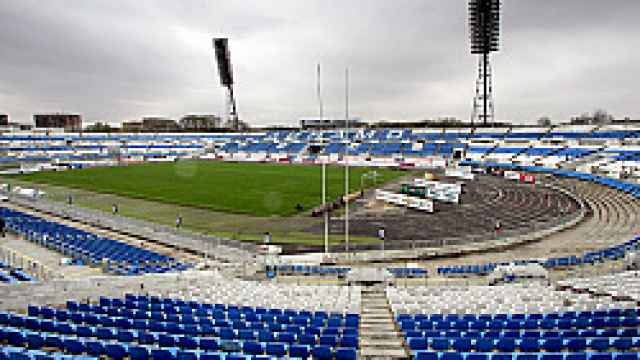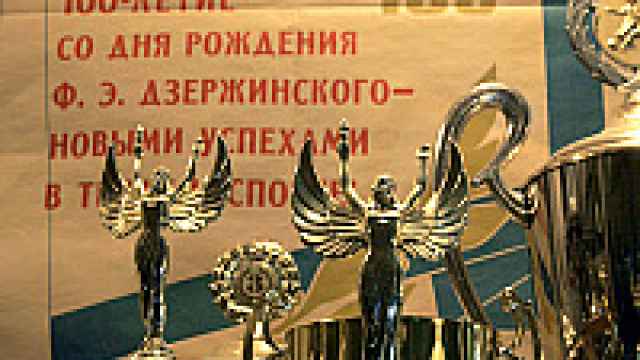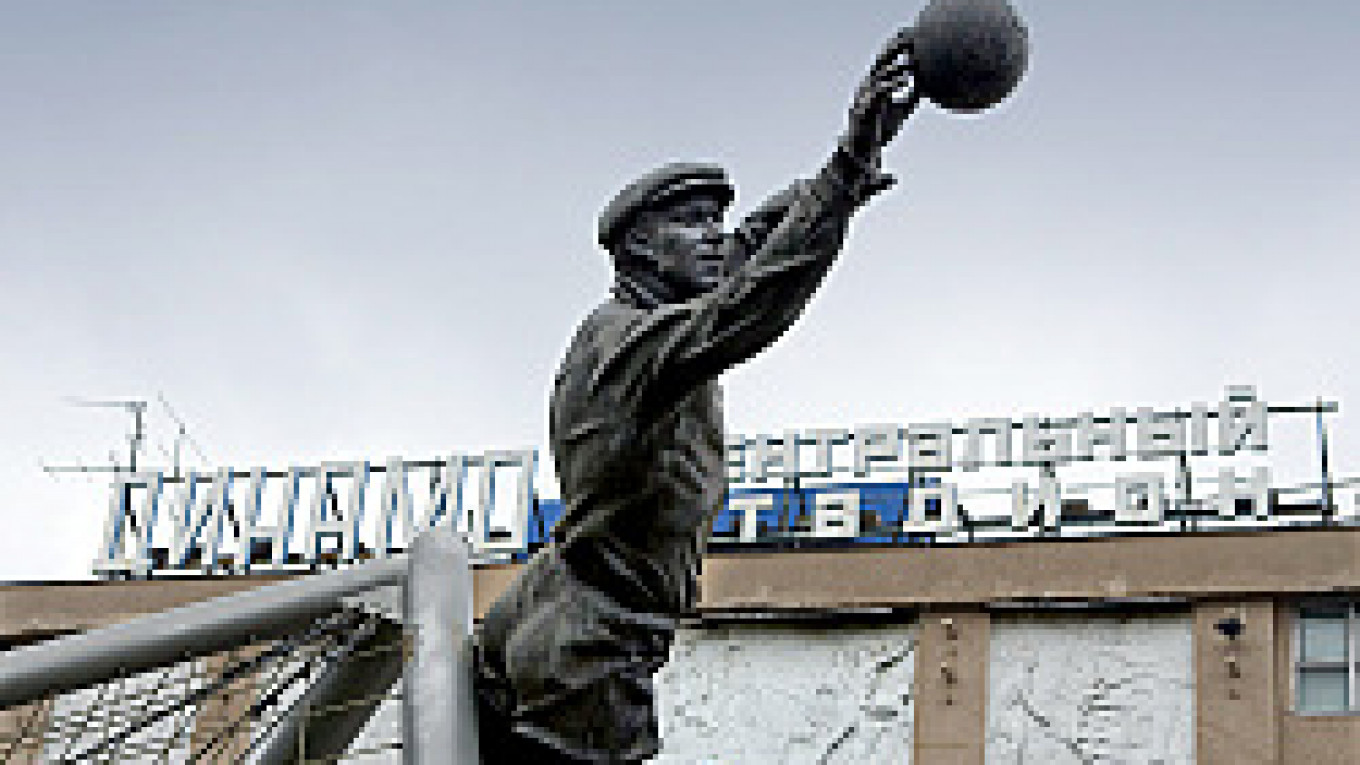From the grimy ticket stalls, flecked with racist graffiti, to the peeling paint and patched-up windows, the home of one of the country's most-decorated football clubs appears a testament not just to one team's decline but also to the broader decay of Russian football.
In 1923, the Dynamo sports club was set up on the orders of Felix Dzerzhinsky, the notorious founder of the Soviet secret police, who wanted his officers in better physical shape.
Now, after years without success, and as the club celebrates its 85th anniversary Friday, the Dynamo Moscow football team is currently riding high in second place in Russia's Premier League ?€” and a new stadium is on the way.
Some of the highest-ranking figures in the country's all-powerful security services have teamed up with one of the country's wealthiest men, metals tycoon Alisher Usmanov, to revive the football club's fortunes.
But with a path from Iron Felix to stainless-steel magnate Usmanov, Dynamo's history encapsulates both the positives and perils of Russian football's close ties to politics and big business.
The Dynamo sports association "unites almost all of the state's security forces, including the Interior Ministry, the Federal Customs Service and the tax services," said Audit Chamber head Sergei Stepashin, who chairs Dynamo's board of trustees.
"At Dynamo we don't like to refer to ourselves as the 'Chekist team,'" Stepashin said, referring to members of the Cheka, the name given to the secret police founded by Dzerzhinsky.
Stepashin headed the Federal Security Service, or FSB, in the 1990s, before becoming interior minister and later prime minister under late President Boris Yeltsin.
The security services continue to hold sway at Dynamo. FSB Deputy Director Vladimir Pronichev is head of the Dynamo sports association, which, in addition to the football club, includes two ice-hockey teams, and basketball and volleyball teams of the same name. FSB chief Nikolai Patrushev heads Dynamo's volleyball club.
During the Soviet era, Dynamo's rivals represented other powerful organizations. Lokomotiv represented the railway workers, CSKA was the army club, and Spartak was essentially the people's club, an amalgamation of trade unions.
In the late 1930s, as the Stalinist purges consumed the country, Dynamo's association with the secret police spilled over into football, taking a grim turn that casts a dark shadow over the club's history.
After Dynamo won the first national championship in 1936 and the league and cup double the following year, crosstown rival Spartak topped the table in 1938 and 1939.
Off the pitch, Dynamo's tactics had turned to intimidation, arrest and even execution after Lavrenty Beria, the feared secret police chief, became honorary chairman of the football club in 1936, Jim Riordan, a British academic and Soviet sports expert who briefly played for Spartak in the early 1960s, wrote in the academic journal Europe-Asia Studies.
As Dynamo's fortunes sagged, Beria, a keen football player from his youth in Georgia, developed a personal vendetta against Spartak founder and Komsomol chief Alexander Kosarev and Spartak's star player, Nikolai Starostin. While Kosarev was executed as an enemy of the people in the late 1930s, Starostin ?€” who once called Beria "a crude and dirty left half" ?€” was hauled off to jail in 1942 along with his three brothers and eventually spent years in a gulag camp before being taken under the protection of his old acquaintance, Vasily Dzhugashvili, son of Josef Stalin.
So dramatic was the Dynamo-Spartak rivalry that it was even turned into the bestselling novel "Dynamo" by British author Tariq Goddard, who heard the story from Riordan.
In his fictionalized account, Goddard portrayed Dynamo as the bad guys, an instrument of state oppression playing murderously dirty to stop the mercurial talents of Spartak.
 Vladimir Filonov / MT A view from the home supporters' section at Dynamo Stadium. Dynamo is hoping to unveil plans next month for a new 35,000-seat stadium for home games. | |
"Dynamo had a different way of playing ?€” they almost followed the state structure of centralized planning for every game ?€” with what would be regarded as the English long-ball technique designed to grind out a result," Goddard said by telephone from his home in Hampshire, England.
Seventy years later, it seems that current fans have still not forgotten the tortured history between the clubs. At a 2006 home match against Spartak, Dynamo supporters held up a huge portrait of Beria with the words: "He Sees Everything."
In response to the gesture, fans of the St. Petersburg club Zenit the following season held up the same picture of Beria during a home match with Dynamo. "You'll Pay For His Sins," was written under the portrait.
At the return match in Moscow, Dynamo fans retaliated with a portrait of Ksenia Sobchak, the socialite daughter of former St. Petersburg mayor Anatoly Sobchak, with the words: "Even in 100 Years You Couldn't Pay For Her Sins."
"We have a respectful, sporting relationship with Spartak," Stepashin said. "Every year at the annual meeting between Dynamo fans and players, the fans always say, 'We can forgive everything, all your defeats, but you just have to beat Spartak.'"
In its most recent home match, Dynamo, for the first time in five years, managed to beat Spartak in a thrilling 4-3 victory Sunday. Angry Spartak fans responded to the loss by tearing out most of the seating in the away fans section, a Dynamo representative said during a tour of the stadium Wednesday.
In one of the most extraordinary and politicized episodes in the country's football history, Dynamo was sent to tour Britain on a groundbreaking trip in 1945.
"As secret police team, Dynamo could be trusted to go overseas as part of propaganda campaign after end of World War II. It was a short-lived one," said Ronnie Kowalski, a professor at Worcester University in Britain who wrote a study on Dynamo's British tour.
From a football point of view, the tour was a raging success. Dynamo drew with Chelsea, before thrashing Welsh side Cardiff City and beating Arsenal in a game remembered principally because it was shrouded in impenetrable fog. The final match was a draw against Scottish side Glasgow Rangers.
Despite being taken to watch Zenit as a child by his father while growing up in Leningrad, the young Stepashin was drawn to the success of the Dynamo team of the era.
"Dynamo in those times ?€¦ was famous throughout the Soviet Union and abroad," Stepashin said, though he admitted he still feels an affinity for Zenit.
Stepashin's experience was typical, as fans from outside Dynamo's traditional police base flocked to follow the club's successes, said Manfred Zeller, a researcher on the subject at Helmut Schmidt University in Hamburg.
"Dynamo after the war was very successful, and so they gained a lot of support," Zeller said. "This then became known as the era of Lev Yashin."
Yashin, the legendary Soviet goalkeeper, was a mainstay of the Dynamo team between 1949 and 1971 and has been voted the greatest goalkeeper of the 20th century. A statue to him now stands outside Dynamo's stadium.
Despite its illustrious history, Dynamo has been in the doldrums for most of the past 15 years, consistently finishing behind local rivals CSKA, Lokomotiv and Spartak.
In a bid to rectify the situation, Dynamo's FSB-linked leadership in February signed a sponsorship deal for the 2008-2009 season with Metalloinvest, owned by steel magnate Usmanov, a Dynamo fan.
If football matches in the Soviet Union pitted army, police and trade union clubs against one another, nowadays they are battles between the country's wealthiest and most powerful clans.
Current champion Zenit is sponsored by Gazprom and headed by Sergei Fursenko, brother of Education and Science Minister Andrei Fursenko.
Lokomotiv is owned by Russian Railways, the state giant run by Vladimir Yakunin, who had a neighboring dacha to President Vladimir Putin's in the early 1990s. Spartak is currently backed by energy giant LUKoil.
Now Dynamo has Usmanov's patronage, and both the metals mogul and Dynamo seem satisfied with the partnership.
 Vladimir Filonov / MT A poster of Dynamo's first chairman, Felix Dzerzhinsky, at the club's museum. | |
"He is a longtime supporter of Dynamo," Stepashin said of Usmanov. "It was his initiative and his personal, sincere desire to help our club."
Usmanov said Thursday that while the deal will give broader coverage to Metalloinvest, he was not sponsoring Dynamo "just for the advertising."
"I really love football and am willing to support the growth of a club that I feel involved with," he said in e-mailed comments. "I want Dynamo to become the best team in Russia."
Usmanov said there was no conflict with his stake in Arsenal, as he owns no shares in Dynamo and Metalloinvest is only sponsoring the Russian club.
For Dynamo fans, Usmanov's cash boost has already brought tangible results, allowing the club to sign national team center forward Alexander Kerzhakov from Spanish side Sevilla.
But with an average attendance of around 10,000 spectators per match and minuscule income from television rights compared with European leagues, Russian clubs are often completely reliant on a sugar daddy.
"Normally clubs are unprofitable and far away from breaking even," said Sharif Galeyev, head of the football finance group at Deloitte CIS. "We believe that a real turn to profitability may appear only in three to four years."
The Champions League final will be played in Moscow next month and Russia's national team has qualified for Euro 2008 this summer in Austria and Switzerland.
With CSKA's victory in the 2005 UEFA Cup final and Zenit going strong in the same competition this year, Russian teams have shown that they can compete with Europe's elite clubs, Galeyev said.
"However, from the financial perspective there is still quite a big gap," he said. "For example, in the 2006 to 2007 season Real Madrid made 351 million euros [$557 million], while Zenit's budget in 2008 is estimated to be up to $120 million."
Metalloinvest's deal with Dynamo is not the first foray into football for the Uzbek-born Usmanov, ranked Russia's 19th-richest man with a fortune of $9.3 billion by Forbes.
In August, Usmanov followed Chukotka governor Roman Abramovich into English football when he bought a stake in London club Arsenal.
Stepashin said he had even discussed with Usmanov earlier this week the possibility of sending Dynamo staff to London to get training at Arsenal.
But money does not necessarily equal success, as Dynamo's experience with other deep-pocketed would-be saviors has shown.
In 2001, the club signed a sponsorship deal with Yukos, then the country's largest oil company, which was headed by Mikhail Khodorkovsky. The partnership seemed ideal to help Dynamo fulfill its dream of returning to prominence. But Khodorkovsky was arrested in 2003 on tax and fraud charges that eventually landed him in prison and led to the dismantling of his business empire.
As Yukos began to sink under the weight of the authorities' onslaught, Dynamo turned to another investor, signing a sponsorship deal in 2004 with Monaco-based Russian businessman Alexei Fedorychev, head of sulfur producer Fedcominvest.
Fedorychev, who chaired Dynamo's board of directors and owned a majority stake in the club, lost no time in pumping an estimated $200 million into the club, bringing in new faces such as Portuguese duo Maniche and Costinha and former Russian national team coach Oleg Rumyantsev.
Six coaches and two seasons later, Dynamo barely managed to avoid relegation, and Fedorychev was jettisoned. In early 2007, he sold his controlling stake in the club for what Russian media reported at the time to be a reduced fee of several million dollars to the Dynamo sport association, headed by Pronichev, the FSB deputy director.
"Business has always influenced Russian football and sometimes in a negative way ?€” as with Dynamo," Stepashin said. "Three years ago we were the richest team in the league, and we almost got relegated."
Five games into the 2008-2009 season, young Dynamo coach Andrei Kobelev and his young team remain unbeaten.
Next month, the club is hoping to unveil plans for a new 35,000-seat stadium to be built on the basis of the current one, said Oleg Tochelovich, the stadium's general director.
"The key moments in the history of the club are happening now, in the present," Stepashin said, pointing to a new training ground and plans for the new stadium.
For the time being, Dynamo fans are cautiously optimistic about the course taken by the club's new management. But they do have some advice.
"A lot of money is a hypothetically a good thing," said Andrei Shulinsky, a spokesman for one of Dynamo's fan clubs. "But you have to spend it intelligently, and in our country we have problem with doing things intelligently."
A Message from The Moscow Times:
Dear readers,
We are facing unprecedented challenges. Russia's Prosecutor General's Office has designated The Moscow Times as an "undesirable" organization, criminalizing our work and putting our staff at risk of prosecution. This follows our earlier unjust labeling as a "foreign agent."
These actions are direct attempts to silence independent journalism in Russia. The authorities claim our work "discredits the decisions of the Russian leadership." We see things differently: we strive to provide accurate, unbiased reporting on Russia.
We, the journalists of The Moscow Times, refuse to be silenced. But to continue our work, we need your help.
Your support, no matter how small, makes a world of difference. If you can, please support us monthly starting from just $2. It's quick to set up, and every contribution makes a significant impact.
By supporting The Moscow Times, you're defending open, independent journalism in the face of repression. Thank you for standing with us.
Remind me later.


